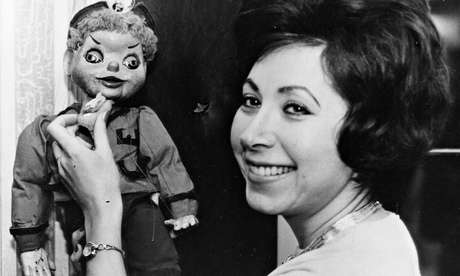
In 1950 Roberta Leigh, her outfit completed with a splendidly elegant hat adorned with black osprey feathers, arrived at the offices of the Hutchinson publishing house in South Kensington, London. The 23-year-old was there to sell her first novel. Using one of her father’s old ledgers, she had begun working on In Name Only, a tale of loveless marriage, as a teenager in 1941. She had noticed that the place where women clustered in her local library in Prestatyn, north Wales, was around the romantic fiction shelves. So she rang Collins the publishers, who, having confirmed that love sold, added that their rate for romance was £1 for 1,000 words.
Hutchinson made a slightly better offer, a straight fee of £75. But Leigh, who has died aged 87, declined the proposal. What she wanted was a deal that included royalties. The company conceded defeat. Within four years Leigh was claiming to be the best-selling author of romantic fiction in Britain. For many years this was at the core of her creativity – “some people like to go to bed with a man, I like to go to bed with a manuscript,” she said – but her career embraced rather more. There was print journalism, magazine publishing – she set up the teen magazine Boyfriend, and a comic, Fun’n’Games – and notably there was her role in commercial TV, in an era when puppets were stalking a low-budget space age.
As for the romance, it came under many pen-names, including Janey Scott, Rosella Lake and Rachel Lindsay, of which Roberta Leigh was the first and most widely used. She would write more than 140 novels and children’s stories over the next five decades, selling more than 25m books in 23 languages. She was, as she would tell the Observer journalist Joanna Slaughter in 1977, “a rarity among writers, a businesswoman”.
By the mid-1950s, having written for the Daily Mirror, she became a columnist on the Daily Herald, but after three years quit the paper to focus on television – and it was then that she came into contact with Gerry Anderson, the man who, in the 1960s, would give series such as Thunderbirds and Captain Scarlet to the world. But in 1957 Anderson, his business partner Arthur Provis and their Slough-based company, Anderson Provis Films, were struggling. Puppet animation was not then their priority; Leigh was thinking differently. Her proposal was The Adventures of Twizzle, which became, in 1957-58, a 52-part series of 15-minute episodes.
This was followed by Torchy the Battery Boy (1959-60), and both were scripted by Leigh. She didn’t write for children, she explained, it was just that she shared their way of seeing the world, in black and white, rather than in grey. At the same time she had persuaded the publishers Michael Joseph to set up a children’s publishing house to market her titles. She wrote the 52 Torchy scripts in 26 days, she said – particularly enjoying writing the funny parts.
Anderson and Provis ended their partnership in 1960 but the latter continued to work with Leigh, who produced more than 240 episodes of her various creations for television, and was the first British female producer with her own TV company. Her shows included Sara and Hoppity (1962); Space Patrol (1962-64), which, as Planet Patrol was a major US success; Send for Dithers (1966); Wonder Boy and Tiger (1966-67) and pilot episodes for Paul Starr (1964) and The Solarnauts (1967).
“I wrote, produced and went out and sold,” she said, but by the late-60s puppets, space and fantasy – the combination that had permeated that TV work – was an exhausted seam, for Leigh, and, separately, for Anderson. Their creations would be rediscovered by new audiences in the 1990s but in 1971 Leigh announced her “retirement”.
Yet, within weeks, she rang Mills & Boon, the company that dominated, and still dominates, the romantic fiction market. Leigh wrote more than 100 titles for them. “It is amazing how grown women collect them … ” she told the Los Angeles Times. “I knew one woman who had 300. I like to think of them as the silent majority.”
She was born Rita Shulman in London. Her father, Samuel, had arrived in the UK, poverty-stricken, from Tsarist Russia, in the times of the pogroms, before the first world war, and married Leah, another immigrant from Russia. He later became a successful fabric buyer and wholesaler. During the second world war, Rita was evacuated to the seaside resort of Prestatyn, in Denbighshire, and educated at St Mary’s convent school in nearby Rhyl.
Back in London, she married Emmanuel Lewin in 1948, who had set up a football pools company, Western Pools, that in 1952 he sold to Littlewoods. She lived much of her life in north London, in Hampstead, and, alongside the writing and television, taught elocution, worked as a graphologist for the police, was a radio agony aunt and showed her work as an abstract painter.
Her husband died in 1981. She is survived by their son, Jeremy, and four grandchildren.
• Roberta Leigh (Rita Shulman Lewin), writer and television producer, born 22 December 1926; died 19 December 2014

